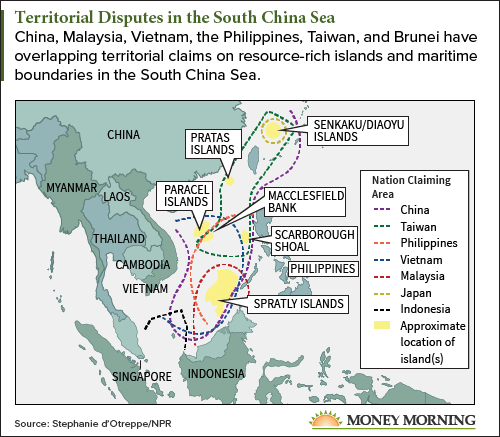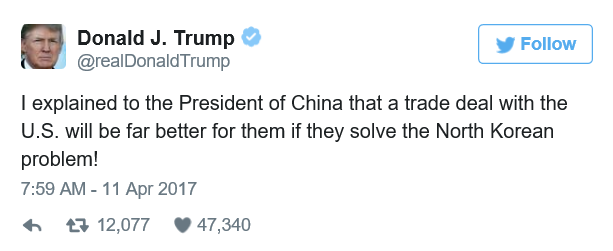China has been benefiting from North Korea's weapons tests and threats toward the United States lately.
You see, the Hermit Kingdom's increasing aggression tactics - including its possible detonation of a hydrogen bomb last Saturday (Aug. 2) - has drawn Uncle Sam's focus so completely in recent months that U.S. involvement in other Pacific maritime disputes has all but failed.

We're talking about the South China Sea.
If you've been following along with us, you'll know that China has laid claim to an enormous swath of the South China Sea, known as the "nine-dash line," ignoring six governments' claims as well as an international ruling from the Hague Tribunal.
And Uncle Sam's distraction is good news for Beijing's excessive maritime claims.
Here's what we mean...
China's New Approach: Out with the Old Tricks, In with the New
While America has been pressuring China to sanction North Korea, it has all but ignored China's recent actions in the South China Sea.
Since April 11, U.S. President Donald Trump has tweeted about China 16 times. Each tweet has mentioned China's attempts (and failures) to curtail the Hermit Kingdom's missile program, and not a single one has addressed its actions in the South China Sea.
In these tweets, Trump has hinted that he will be more willing to strike better trade deals with China if it helps disarm North Korea. But if the United States won't pay attention to developments in the South China Sea, it may lose the leverage needed to strike any kind of trade deal at all.

You see, China has found new ways to gain diplomatic ground in the South China Sea while America has been focusing on Beijing's relationship with Pyongyang. In addition to its "old tricks," China's tried a few new ones in its efforts to gain total sovereignty over the resource- and trade-rich waters...
China's old tricks:
- Continued construction of artificial islands in the disputed waters.
- Threats to Vietnam and India over their respective oil drilling projects in the region (at the risk of an attack on their bases should they fail to comply).
- Prolonged demands that countries within the nine-dash line not claim sovereignty over parts within. China most recently directed such a demand at Indonesia for its decision to rename part of the region the "North Natuna Sea."
China's new tricks:
- Economic deals.
On May 8, 2017, China pledged $24 billion in aid and investment to the Philippines – after which the small island nation ceased contesting China's sovereignty claims in the South China Sea.
Beijing also offered Malaysia $17.7 billion on Aug. 9 to subsidize a joint rail link project, touted as the most expensive infrastructure venture under China's ambitious "Belt and Road" initiative.
- Wearing the "little guys" thin.
Other Association of Southeast Asian Nations (ASEAN)countries have stopped fighting Beijing altogether – such as Malaysia and Taiwan. Malaysia has suffered intense internal strife, making a tussle with the world’s largest country virtually impossible.
Taiwan has struggled with diplomatic in-fighting as well -- thanks to China in particular. After President Tsai Ing-wen's election last year, China cut off all contacts with the Taiwanese government.
This, in turn, had a devastating economic impact on the small nation and caused Tsai’s approval rating to plummet to just 33%, reported The San Francisco Chronicle on Sept. 4. Now, Taiwan too has given up the South China Sea fight in order to seek better relations with Beijing instead.
Overall, China's new "promise money or pressure" maneuvers could ostensibly replace its long-utilized strong-arm tactics - the old tricks - in the South China Sea.
Must See: The South China Sea is about to get violent. But thanks to a small $6 U.S. defense firm with a top-secret new technology, China is about to be taken to the woodshed. Read more...
And, for the nine-dash-line countries involved, China does seem to make for a more useful diplomatic cohort these days than the United States, which has done little in recent months to reassure them of its loyalty and protection. Indeed, the most we've seen from America in this region is a joint statement on Aug. 6 with Japan and Australia calling for Beijing to abide by a South China Sea "code of conduct."
And after China completely ignored the Hague ruling in the Philippines' favor last year, a code of conduct seems laughably inadequate.
What's more, its nine-dash-line neighbors didn't press the matter further - more evidence of the countries' collective "change of heart."
Overall, this change of heart in the South Pacific could very well indicate Washington's slow but steady exclusion from the region.
Here's what that might look like...
What a U.S. Shutout in the South China Sea Would Look Like
[mmpazkzone name="in-story" network="9794" site="307044" id="137008" type="4"]
Many nations, the United States chief among them, traverse the South China Sea for trade.
If China's sovereignty claims were to go uncontested by all other countries therein, the Red Dragon could ostensibly slap tariffs on any goods passing through these waters. They could even block trade altogether.
As of right now, $3.37 trillion in global trade flow annually through those waters, reported The Diplomat on Aug. 7. The maritime region is also rich with oil, natural gas, hydrocarbon, and fish stocks.
Now, doing anything to restrict global trade would be detrimental to China as well, but if the Red Dragon were able to turn the trade faucet on or off at will, it would be a nightmare for the rest of the world - especially the United States.
And while the Chinese have promised many times that they respect freedom of navigation and don't need U.S. presence to abide by it, there is good reason to believe the Red Dragon isn't telling the truth.
The Chinese could block trade routes in the South China Sea, which would need to be diverted elsewhere at considerable cost.
It's done this with Japanese goods before. In 2010, for example, Beijing blocked crucial mineral exports to Tokyo that were used in products like hybrid cars, wind turbines, and guided missiles. This embargo temporarily disrupted several facets of Japan's commercial industries - many of which could not fulfill orders as a result, The New York Times reported in September 2010.
China could easily do this again - especially if it wields total control there.
There Is Profit in the South China Sea's Militarization
"The South China Sea has been militarized," Money Morning Executive Editor Bill Patalon told his Private Briefing subscribers on Aug. 17. "That makes it a huge potential 'flash point' that could destabilize world markets."
Indeed, Bill believes Beijing isn't looking for a true "consensus" - not now, not ever.
"In the South China Sea," he says, "Beijing's idea of cooperation is 'you cave in and agree to let us do whatever we want.'"
Which means that, one day, it could very well become a fight between world powers in the disputed region.
Between Washington and Beijing, in particular.
And, with that likelihood in mind (plus North Korea's increasing threats), the United States continues to build up its defense systems - at home and abroad - with the THAAD and the GMD.
And one company is involved in the "Great American Shield" on all fronts...
Meet Aerojet Rocketdyne Holdings Inc. (NYSE: AJRD) - a rocket engine venture that is a key supplier to both the THAAD and the GMD programs.
Aerojet is a longtime favorite of Bill's.
In fact, Private Briefing subscribers who grabbed shares on Bill's initial recommendation have already doubled their money on the pick. (Bill first recommended the rocket engine venture as a "buy" in 2013 - under its former name, GenCorp Inc. - long before this Pyongyang mess hit the headlines.)
In 2017 alone, AJRD has seen a 63% share price increase - from $18.41 on Jan. 3 to $29.21 today.
For context, Aerojet has beat the S&P 500 this year by 53%.
And as the North Korean threat and tensions in the South China Sea escalate, those numbers will rise.
Get in on these profit plays yourself right here.
Up Next
This small $6 U.S. defense firm with a new top-secret technology could help the Pentagon stop a Chinese sneak attack dead in its tracks. Read more...
Follow Money Morning on Twitter @moneymorning, Facebook, and LinkedIn.
Related Articles:
- Money Morning: North Korea's Astounding Strides in Missile Technology Come from a Shocking Source
- Money Morning: Two North Korean Satellites Are Orbiting Above the United States Right Now with Unknown Payloads
- Money Morning: How Does North Korea Make Money?
[mmpazkzone name="end-story-hostage" network="9794" site="307044" id="138536" type="4"]


